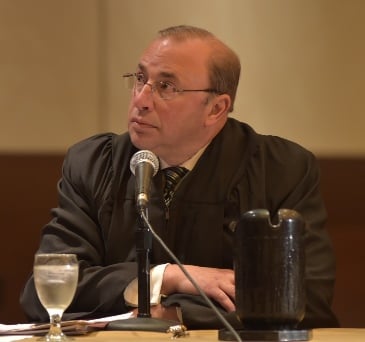Physicians at Monday’s open forum of the Litigation Center of the AMA and State Medical Societies heard both sides of an important patient safety case currently before the nation’s highest court.
The Supreme Court of the United States’ decision in North Carolina State Board of Dental Examiners v. Federal Trade Commission (FTC) will determine whether state health care licensure boards can retain their authority to shield patients from potentially unlawful practice. Attorneys “argued” the case in a mock court session during the 2014 AMA Annual Meeting.
Presenting the opening arguments the state licesnsing board is expected to make was Jack R. Bierig, a partner in the Chicago law firm of Sidley Austin. Richard Feinstein, a partner in the Washington, D.C., law firm Boies, Schiller and Flexner, argued the position the FTC is expected to assert. He previously served as director of the FTC’s bureau of competition. Mark E. Rust, a managing partner of Barnes and Thornburg in Chicago, acted as judge.
A key issue is whether a state professional licensure board, acting as an agency of the state, is immune to antitrust laws. If not, qualified and conscientious professionals may be discouraged from serving on licensure boards for fear of becoming embroiled in federal antitrust litigation, ultimately distorting health care policy and harming patients, Bierig said.
The members of North Carolina’s dental board, who are elected to the state licensure position, sent cease and desist letters to non-dentist providers offering teeth whitening services. The non-dentist providers then complained to the FTC.
The FTC is expected to argue that the state licensure board was subject to antitrust laws because of the composition of the board, which is primarily competitive professionals, and that the board exceeded its authority in sending cease and desist letters.
Bierig, however, argued that the board was acting as a state agency by determining what constituted the practice of dentistry and how limiting non-dental provider whitening services could protect North Carolina patients. He added that the election of board members, rather than appointment, didn’t matter because the state decided its dental licensing board should be made of dentist-elected members.
“We’re all in favor of competition and the market making decisions,” Bierig said. “But we have to balance that interest against federalism issues …. Where the two clash, the antitrust laws have to give way to the federal system in which states and state agencies are sovereign.”
The AMA and other health care organizations filed an amicus brief expressing support for the plaintiffs in this case and stating fear that if the court ruled for the defendant, it would have a chilling effect on state medical and dental boards to the detriment of public health.
Briefing on this case in the U.S. Supreme Court should be finished soon, and oral arguments are expected to be scheduled for the fall.




